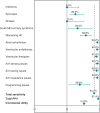Effectiveness of remote monitoring of CIEDs in detection and treatment of clinical and device-related cardiovascular events in daily practice: the HomeGuide Registry
- PMID: 23362021
- PMCID: PMC3689436
- DOI: 10.1093/europace/eus440
Effectiveness of remote monitoring of CIEDs in detection and treatment of clinical and device-related cardiovascular events in daily practice: the HomeGuide Registry
Abstract
Aims: The HomeGuide Registry was a prospective study (NCT01459874), implementing a model for remote monitoring of cardiac implantable electronic devices (CIEDs) in daily clinical practice, to estimate effectiveness in major cardiovascular event detection and management.
Methods and results: The workflow for remote monitoring [Biotronik Home Monitoring (HM)] was based on primary nursing: each patient was assigned to an expert nurse for management and to a responsible physician for medical decisions. In-person visits were scheduled once a year. Seventy-five Italian sites enrolled 1650 patients [27% pacemakers, 27% single-chamber implantable cardioverter defibrillators (ICDs), 22% dual-chamber ICDs, 24% ICDs with cardiac resynchronization therapy]. Population resembled the expected characteristics of CIED patients. During a 20 ± 13 month follow-up, 2471 independently adjudicated events were collected in 838 patients (51%): 2033 (82%) were detected during HM sessions; 438 (18%) during in-person visits. Sixty were classified as false-positive, with generalized estimating equation-adjusted sensitivity and positive predictive value of 84.3% [confidence interval (CI), 82.5-86.0%] and 97.4% (CI, 96.5-98.2%), respectively. Overall, 95% of asymptomatic and 73% of actionable events were detected during HM sessions. Median reaction time was 3 days [interquartile range (IQR), 1-14 days]. Generalized estimating equation-adjusted incremental utility, calculated according to four properties of major clinical interest, was in favour of the HM sessions: +0.56 (CI, 0.53-0.58%), P < 0.0001. Resource consumption: 3364 HM sessions performed (76% by nurses), median committed monthly manpower of 55.5 (IQR, 22.0-107.0) min × health personnel/100 patients.
Conclusion: Home Monitoring was highly effective in detecting and managing clinical events in CIED patients in daily practice with remarkably low manpower and resource consumption.
Keywords: Implantable cardioverter defibrillators; Pacemakers; Remote monitoring; Telemedicine.
Figures


Comment in
-
Remote monitoring of patients with cardiac implantable electronic devices: maximizing gains by addressing workflow.Europace. 2013 Jul;15(7):921-3. doi: 10.1093/europace/eut065. Epub 2013 Apr 17. Europace. 2013. PMID: 23594932 No abstract available.
-
Author reply: To PMID 23362021.Europace. 2014 Jul;16(7):1099-100. doi: 10.1093/europace/eut421. Epub 2014 Feb 23. Europace. 2014. PMID: 24567236 No abstract available.
-
Effectiveness of remote monitoring of cardiac implantable electronic devices in detection and treatment of clinical and device-related cardiovascular events in daily practice: the HomeGuide Registry.Europace. 2014 Jul;16(7):1099. doi: 10.1093/europace/eut396. Epub 2014 Feb 23. Europace. 2014. PMID: 24567237 No abstract available.
References
-
- Wilkoff BL, Auricchio A, Brugada J, Cowie M, Ellenbogen KA, Gillis AM, et al. HRS/EHRA expert consensus on the monitoring of cardiovascular implantable electronic devices (CIEDs): description of techniques, indications, personnel, frequency and ethical considerations. Heart Rhythm. 2008;5:907–25. - PubMed
-
- Dubner S, Auricchio A, Steinberg JS, Vardas P, Stone P, Brugada J, et al. ISHNE/EHRA expert consensus on remote monitoring of cardiovascular implantable electronic devices (CIEDs) Europace. 2012;14:278–93. - PubMed
-
- Varma N, Epstein A, Irimpen A, Schweikert R, Shah J, Love CJ. TRUST Investigators. Efficacy and safety of automatic remote monitoring for ICD follow-up: The TRUST trial. Circulation. 2010;122:325–32. - PubMed
-
- Crossley GH, Boyle A, Vitense H, Chang Y, Mead RH. CONNECT Investigators. The Clinical Evaluation of Remote Notification to Reduce Time to Clinical Decision (CONNECT) Trial: the value of wireless remote monitoring with automatic clinician alerts. J Am Coll Cardiol. 2011;57:1181–9. - PubMed
-
- Landolina M, Perego GB, Lunati M, Curnis A, Guenzati G, Vicentini A, et al. Remote monitoring reduces healthcare utilization and improves quality of care in heart failure patients with implantable defibrillators: The EVOLVO (Evolution Of Management Strategies Of Heart Failure Patients With Implantable Defibrillators) Study. Circulation. 2012;125:2985–92. - PubMed
Publication types
MeSH terms
Associated data
LinkOut - more resources
Full Text Sources
Other Literature Sources
Medical

